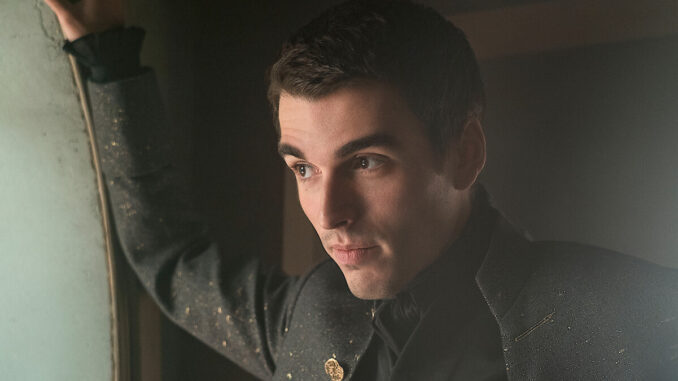
The Queen Charlotte star says it was “a crushing responsibility.”
On the same day that Queen Charlotte: A Bridgerton Story swanned into the ballroom, so to speak, leading man Corey Mylchreest, who plays King George, woke up to many, many WhatsApp messages. Among the “lovely” notes was one from Jonathan Bailey, who plays reformed rake Anthony in Bridgerton.
“He was saying that people often think that, when the show comes out, you are flying high — you’re at your most confident, you’re feeling brilliant,” Mylchreest tells Tudum. “When actually, it’s the work that you did finishing the job — for example, when we finished shooting the last day — that [was what] felt great.”
It’s Mylchreest’s passion for playing the romantic, complicated young King George that feels rewarding — not the “surreal” experience of seeing his face on a billboard or watching his Instagram follower count rise. He lights up when discussing the inner workings of King George’s mind, whose struggles are one of the driving factors of the series. While the king loves his wife, Queen Charlotte (India Amarteifio), his health createss obstacles in their marriage.
“This is a man who has an idea of what he wants, who has an idea of equity and equality, yet has just been imprisoned by his own trauma and his affliction,” Mylchreest says. But, “through meeting Charlotte, he has been inspired and has been gifted an opportunity to use his privilege.”
Below, Mylchreest explains how King George’s marriage changed the young king’s life — and how playing this part changed Mylchreest’s life, too.
King George is dealing with a lot more than just being a newlywed. He’s also a key player in the “Great Experiment,” which is Queen Charlotte’s depiction of the integration of Britain’s noble class. How involved is King George in this?
Young King George is caged by Parliament, his mother [Princess Augusta, played by Michelle Fairley] and her advisers. He has very little power. But there’s a conversation that Charlotte has with him in Episode 3, following a conversation that she had with Lady Danbury [Adjoa Andoh]. She says, “Our palace walls are too high.” Immediately George understands, and he overcomes what he’s been afraid of doing because he knows his privilege. He knows how to be an ally, and he uses his power.
Do you have a favorite example of that part of his journey?
Excuse my French, but he just shows the fuck up. He gets there at Lady Danbury’s ball in Episode 3, and immediately everyone bows because he’s the king and he never turns up to these things. But he’s deliberately chosen to turn up.
I always thought it was beautiful because he says, “Lord and Lady Danbury, thank you for having me.” His thanks places reverence and respect onto them, because they are the king and queen of that moment. Also at the end of that dance, George bows deeper than Charlotte. The language of that means, “You are in control, you are the power.” People at the court would understand every inch of that physical vocabulary. People were microscopic and forensic about how people moved at those things.
Every ball looks so beautiful. Were there any locations that really inspired your performance?
All of them, really. You’d go around and you’d see these stately homes and the grounds and the architecture and the paintings and the art inside. But I will always remember Blenheim Palace. It was where India and I did our very first scene on the first day of the production. [It’s also where] we filmed the last moment that we see George and Charlotte at the ball in Episode 6. It felt like we came full circle.
The first time we got there — my lord, did I feel nervous — I felt completely overpowered by this enormous building. There’s actually then a moment in Episode 6 where George looks up to it. He’s being led by the hand of Charlotte, and he’s terrified of re-entering that building. That’s what I felt that first time because I was stepping into the shoes of this person who I’d fallen in love with doing research.
How did that research color your performance?
Not only did I want to, I needed to do him justice and give him a voice. Stepping into those places that have been lived in by these types of people, it felt very serious. It felt very, very much like a responsibility — a sense of crushing responsibility — which is exactly what George felt with the crown. In loads of different ways, I was constantly reminded of how similar we are.
Speaking of Episode 6, what was it like filming the under-the-bed final scene? It was the only time you and India filmed with the older versions of your characters, played by James Fleet and Golda Rosheuvel.
That is the genius of director and executive producer Tom Verica. He texted me and India and he said, “Learn that last scene, and come in ready to do the entire thing.”